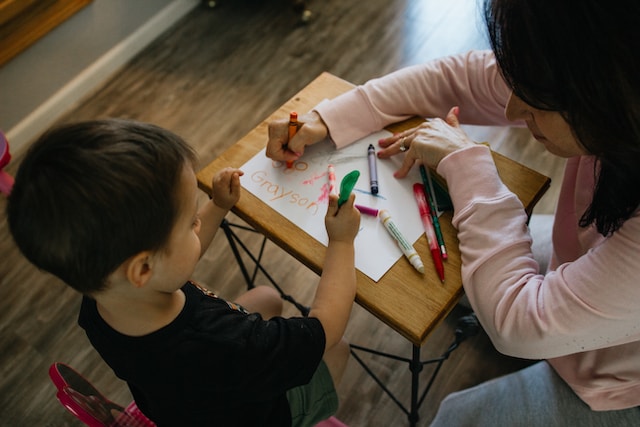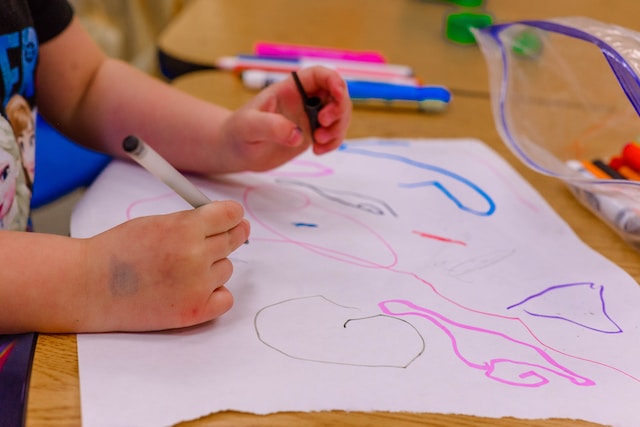Govan nurseries provide education and care to children up until their school entry date, typically between 8am and 6pm during 50 weeks per year. Staff in Govan nursery schools and ELCs work closely with you to support your child’s learning, development and progression. They employ the “Getting it Right for Every Child” (GIRFEC) approach in order to meet all their needs.

Communication skills
Communication skills are one of the cornerstones of child development. Children learn to express their thoughts, ideas, and emotions by watching, imitating, and copying others around them. Building these abilities from an early age boosts self-esteem, creative expression ability, as well as overall well-being.
Govan nurseries prepare their students for primary school by engaging them in various activities designed to strengthen communication skills. These may include story-telling sessions, bilingual lessons and games designed to increase speaking and listening.
Communication games provide children with opportunities to not only strengthen their language skills but also socialise with peers and form meaningful relationships, helping them become more independent in daily life.

Children may feel excluded from their peers due to poor communication skills, leading them down a difficult path towards finding their place in society. This can create additional stress while they try to find their place.
East Ayrshire’s Speech and Language Therapy Early Years team provides services for families whose children are having trouble communicating their thoughts, emotions or ideas through appointments and virtual drop-in sessions with our team of Speech-Language Pathologists. Their appointments and virtual drop-in sessions give parents peace of mind.
They are dedicated to helping families develop the English language proficiency of their child(ren). To do this, a visiting teacher is available who can support those whose primary language is not English as well as those having difficulties communicating in English.
Govan may be one of the poorest areas in Glasgow, yet its social welfare network remains strong, featuring two charity nurseries (Broomloan and Govan Family Learning Centre), as well as a local school that stands alone as an innovative project in South-Central Glasgow. Govan provides support to people struggling with poverty or deprivation – empowering them to succeed despite difficult circumstances.
Physical development
Children learn most during the first five years, so it is critical that their physical development be carefully nurtured and enhanced during this period. This should include learning to crawl, walk, run, jump and climb safely and independently.
There are various methods by which a nursery can achieve this objective, including running around on local playgrounds, playing ball games and attending dance classes.
Early Years Foundation Stage (EYFS), which establishes standards for learning and development from birth to five, acknowledges the significance of physical development through activities such as crawling, grabbing, and walking and emotional and social development related to these activities.
Children need opportunities to develop their physical abilities as this will enable them to become more independent and self-confident in later years. This may include helping build muscle strength or increasing self-esteem.
Ofsted warned early years providers not to restrict children from taking risks out of fear they will injure themselves, which it states could hamper experiences and limit education later in life by not offering opportunities to build strength and dexterity.
Nursery providers can take several steps to foster physical development in children in preparation for primary school, such as ensuring their environments are safe and encouraging their teachers to provide various activities for them to enjoy.
One way a nursery can accomplish this goal is by providing an area where children can engage in physical activity, such as climbing frames and obstacle courses, as well as by taking day trips to places such as libraries and parks.
Mental development
Mental abilities development is a core element of early childhood. This development is often defied to encompass skills like attention, perception, memory, thinking and reasoning, as well as expanding intelligence and language development.
Mental development is a critical element in helping children transition to primary school, as it allows them to gain independence and establish their identity. With the right preparation and guidance from parents and educators alike, children can gain the tools needed for academic success as well as make wise life choices.
Sensorimotor stages of mental development occur between birth and age three. At this point, physical actions such as crawling, walking, sitting and standing begin to form along with early representational thought processes.
Children also begin forming relationships during this stage. They meet their friends, family members and teachers.
Children learn to recognise that everyone has different feelings and perspectives, while simultaneously developing empathy – an invaluable trait in developing social relationships.
At four, children begin to use their senses more effectively, which allows them to explore their environment more fully – an essential aspect of mental development.
Focusing on objects such as an apple is an integral component of this phase and allows children to distinguish among shapes when they appear.
At this stage of development, children exhibit great curiosity. They want to know everything there is about their surroundings and try to identify people and objects they come across.
Sooner or later, he begins to notice things and people he likes and attempts to emulate their mannerisms and behaviour.
These abilities are an integral component of mental development and manifest themselves differently for every individual, thus making them truly individual in nature.
Govan nurseries promote children’s emotional well-being and assist in their mental development as they transition into primary school by offering counselling, play therapy and training services for parents. Sessions take place locally to minimise travel times for families – this delivery model aims to prevent issues from escalating and improve mental health among both children and families.

